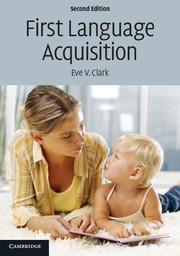Book contents
- Frontmatter
- Contents
- List of tables, boxes, and figures
- Acknowledgements
- 1 Acquiring language: Issues and questions
- Part I Getting started
- Part II Constructions and meanings
- Part III Using language
- Part IV Process in acquisition
- 15 Specialization for language
- 16 Acquisition and change
- Glossary
- References
- Name index
- Subject index
16 - Acquisition and change
from Part IV - Process in acquisition
- Frontmatter
- Contents
- List of tables, boxes, and figures
- Acknowledgements
- 1 Acquiring language: Issues and questions
- Part I Getting started
- Part II Constructions and meanings
- Part III Using language
- Part IV Process in acquisition
- 15 Specialization for language
- 16 Acquisition and change
- Glossary
- References
- Name index
- Subject index
Summary
Children follow an extraordinary trajectory as they learn their first language. They start in on the speech stream within months, weeks, or even days of birth and break it into manageable pieces. By age one, they have started to associate groups of sounds with meanings and to use them to express their own intentions. In the next several years, they analyze many expressions, assign meanings to the parts, and start making use of a larger range of constructions to express their intentions. Another three to four years later, they have attained a vocabulary of close to 14,000 words and are becoming increasingly skillful in how they use language in a range of settings. They have by now mostly mastered the conventional forms for expressing common meanings used in the speech community.
Within acquisition, researchers need to account for both continuity and change in what children know about their first language. This in turn requires us to decide what counts in assessing continuity as well as change. And while most changes move children closer to the conventional patterns of the speech community, it may be harder to identify the developmental links between forms and functions produced at one-and-a-half and at four without scrutiny of the paths children follow. Another factor is general cognitive development, which affects or interacts with their growing skill with language. Finally, we need to specify the general mechanisms children rely on as they acquire language.
- Type
- Chapter
- Information
- First Language Acquisition , pp. 378 - 400Publisher: Cambridge University PressPrint publication year: 2009



